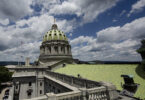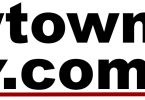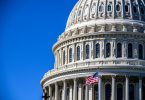By Dave Lemery | The Center Square
Every year, Pennsylvania Gov. Tom Wolf’s budget address draws both praise and criticism, and despite his rhetorical attempts to find common ground with his political opponents, his 2020 address Tuesday was no different.
Republican legislative leaders especially took issue with the governor’s assertion that his budget plan would not raise any taxes. In a news conference after the speech, they pointed out that his Restore Pennsylvania proposal, while technically not part of the budget itself, is still factored in. And that plan requires borrowing $4.5 billion to be paid off over the course of 20 years via a new severance tax on natural gas drilling.
Senate Majority Leader Jake Corman also noted that the proposed decrease in the corporate net income tax rate in Wolf’s budget is more than offset by a plan to require combined reporting.
“So you put those two together, and you’re well over half a billion [in new tax revenue],” Corman said. “Plus there’s other things as well. But that’s at least the two headliners in his proposal.”
Rep. Stan Saylor, the House Appropriations Committee chair, and Sen. Pat Browne, his counterpart in the Senate, took umbrage at reported overspending during the current fiscal year by the Wolf administration and proposals to carry some of that spending in the next budget.
“The two biggest offenders of overspending are usual suspects, the Department of Health Human Services and the Department of Corrections,” Saylor said at the news conference. “The governor’s proposal says that DHS needs an additional $492 million in the current year. When you dig into the proposal, you can see they also buried another $307 million in current year costs, which were pushed into next fiscal year. That means DHS needs an additional $800 million just in its current fiscal year.”
On the other side of the political spectrum, Senate Democrats were enthused about the governor’s proposal.
“We are excited to work with @GovernorTomWolf, especially on a number of policies & funding plans he outlined today that include many of the items we have been discussing,” the Senate Democrats’ Twitter account said.
“This budget plan would hold the line on taxes while stoking investment in education, job training and business expansion,” Sen. Wayne Fontana, D-Pittsburgh, said in a statement. “I was particularly pleased that the governor voiced his support for several of my legislative initiatives. For example, the governor is seeking more dollars for public school funding, early education programs and grant support for college students.
House Democrats were similarly pleased.
“Our children deserve a high-quality public education regardless of where they grow up,” Rep. Matt Bradford, the Democratic chairman of the Appropriations Committee, said in a statement. “Two budget initiatives presented by Governor Wolf today – investing an additional $30 million to fund high-quality pre-K and mandating free, full-day kindergarten – are commonsense steps to ensure kids receive the type of full-time learning environment they deserve during their formative years, which research shows us is vital for social skills, cognitive development and lifelong economic mobility.”
The governor’s plan to use revenue from joining the Regional Greenhouse Gas Initiative to fund transportation improvements drew praise from at least one environmental group.
“Governor Wolf mapped out a strong vision to better the lives of all Pennsylvanians, including a firm commitment to joining the Regional Greenhouse Gas Initiative,” Mark Szybist, senior attorney at the Natural Resources Defense Council, said in a news release. “Not only would this curb harmful climate pollution – it would also help clean up the air our children breathe, enable Pennsylvania to invest in a transportation system that works for everyone, and create family-sustaining jobs and a more equitable society.”
The nonprofit Commonwealth Foundation, which advocates for small government and market-based solutions, was much more critical of the governor’s address.
“Gov. Wolf’s proposed General Fund Budget of $36.1 billion would increase spending by 6.1% over last year’s enacted budget,” wrote Nathan Benefield, the foundation’s vice president and chief operating officer. “His overall spending plan – a $89.3 billion operating budget – represents an increase of 3%. These increases significantly exceed taxpayers’ ability to pay.”
Benefield noted that if the Taxpayer Protection Act were in effect, the most the state budget could grow to is $34.7 billion. Under the TPA, state budget growth would be pegged to population growth and the rate of inflation.
The foundation also lamented the overruns during the current fiscal year that Saylor and Browne had noted.
“Routine cost overruns hide the true growth in spending, side-step lawmakers’ ability to prioritize spending, and add to Pennsylvania’s already high tax burden on working families,” Benefield said. “Legislators need to take back control by adopting honest budgeting, including House Bill 1861 (Rep. Seth Grove) and Senate Bill 885 (Sen. Kristin Phillips-Hill) that would require supplemental spending to be voted on in a standalone bill.”









